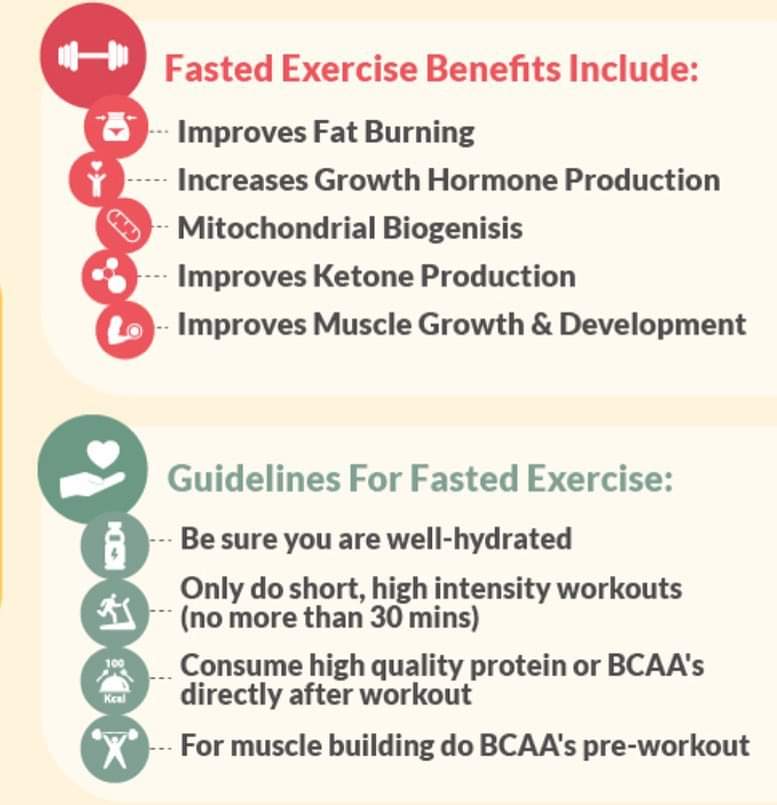
Fasting benefits and science
When you eat you store some of that energy in the liver as glycogen but after 10 to 12 hours of not eating your glycogen reserves will be extremely low as a result you may feel more irritable than normal a term scientists call hungry
The upside is with little glycogen left fat cells in your body release fats into your bloodstream the fat cells head straight to your liver where they’re converted to energy for your body and brain so you are literally burning fat to survive blood samples show that people who had fasted for 12 to 24 hours experienced a 60% increase in energy from fat with the biggest
change occurring after 18 hours this is
the benefit to intermittent fasting
because it puts you in a state called
ketosis and it’s why researchers think
intermittent fasting could be the key to
a longer healthier life the process of
burning fat releases chemicals called
ketones in the brain
Ketones trigger the release of an
important molecule called BDNF BDNF
helps build and strengthen neurons and
neural connections in areas of the brain
responsible for learning and memory
which could explain why a boost in
ketone production has been shown to
improve memory and people with early
signs of dementia in as soon as six
weeks increasing ketones in the body is
also a common treatment for patients
with severe epilepsy you don’t
necessarily have to fast to boost your
ketone levels introducing more fatty
foods into your diet and cutting back on
carbs can have a similar effect a group
of people who tried this method for
three months not only lost weight and
body fat but also saw a decrease in
blood pressure and
hormone that is related to aging and
disease but scientists have discovered
that fasting increases ketone levels
more ketogenic diets can increase
ketones fourfold whereas fasting has
been shown to increase ketones by up to
20 fold as a result fasting compared to
a ketogenic diet may have a stronger
more beneficial effect on overall health
yet many Americans who eat 3 meals a day
with snacks in between never reach
ketosis and therefore aren’t producing
enough ketones to promote good health
fasting and ketosis have been a key to
our survival from the beginning they
helped our ancient ancestors survive
through bouts of starvation and today
they’re becoming recognized as a way to
help keep future generations mentally
and physically disease-free
you
levels introducing more fatty
foods into your diet and cutting back on
carbs can have a similar effect a group
of people who tried this method for
three months not only lost weight and
body fat but also saw a decrease in
blood pressure and
hormone that is related to aging and
disease
Being in a fasted state allows the body to autophage (clean up) senescent cells (your old cells that have accumulated junk protein products and have now stopped reproducing). Senescent cells are associated with ageing, and may be precancerous cells. Multiple studies, including a 2009 Nature review article, have looked at the association between fasting, aging and cancer. Several proteins such as SIRT1 and and HUR are known to be involved, and although the complete bio-molecular pathway is not yet identified, but current findings are promising. This is all related to the studies showing that calorie restriction (therefore fasting) reliably increases lifespan 30-50% across diverse mammalian species (rats, dogs, etc). 2) Being in a fasted state is when the recycling of old and defective mitochondria occurs. Mitochondria are your cellular power plant, there are thousands of them within each cell, and they convert glucose into ATP, the energy molecule uses by intracellular processes. Similar to senescent cells, old mitochondria have accumulated damage to their DNA as well as degraded proteins and, when defective, they produce more reactive oxygen species (ROS) than clean energy (ATP). Overall, it seems our bodies are great at clean up and healing on a cellular level when they aren’t busy breaking down food and converting it into new proteins or fats.